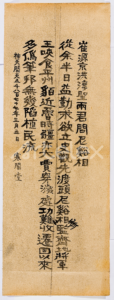Lee Yu-rip (December 18, 1907 – April 18, 1986) was a Korean religious leader and nationalist activist, known as the leader of the small religious group, Taebaekgyo. His family origin was Goseong, and he held various pen names such as Chaeyoung, Jungjeong, Hanamdang, Jeongsan Choin, Danhasanin, Hosang Pogak, and Danhakdongin. He was a descendant of Lee Am, a civil official during the late Goryeo period, and was born in Gugok-myeon, Sakju-gun, Pyeonganbuk-do.
From a young age, Lee studied classical Chinese and claimed to have participated in the March 1st Movement in 1919, supporting the independence movement. In 1921, he organized and became the leader of the Joseon Independence Youth Corps. He later graduated from Sakju Higher Ordinary School and showed an early interest in poetry, publishing works in the monthly magazine Joseon, issued by the Japanese Governor-General of Korea during the 1930s.
However, much of Lee’s supposed involvement in the independence movement is based on his own writings, and these claims have not been cross-verified by other sources. Additionally, there are suspicions regarding his collaboration with Japanese authorities, as he was involved in pro-Japanese activities during the colonial period. Lee actively participated in pro-Japanese organizations such as the Joseon Confucian Association and served as editor of its journal, Ilwol Sibo. He also worked as the head of the Sakju branch of the Dong-A Ilbo during its pro-Japanese phase after the Second Sino-Japanese War.
Religiously, Lee Yu-rip claimed to be a leader within nationalist movements such as the Dahnakhwae and Taebaekgyo, but these groups are regarded as minor religious sects. He later assumed leadership of the Dandanhwae, which he restructured as a nationalist religious organization. Lee also claimed to be the custodian of Hwandangogi, a controversial text purported to detail Korea’s ancient history. However, many scholars believe that Lee authored the text himself, and the content has faced criticism for including pro-Japanese elements. Moreover, Lee passed on this text to General Park Chang-am, who later handed it over to Japanese ultranationalist historian Kajima Noboru. Kajima praised Lee for providing a text that supported the theory of shared ancestry between Koreans and Japanese, known as the Ilseondongjoron theory, sparking further controversy.
Lee continued his religious and nationalist activities until his death on April 18, 1986, at the age of 78. While some recognize him as a nationalist, the lingering suspicions of collaboration with Japanese authorities have cast a shadow over his legacy.

